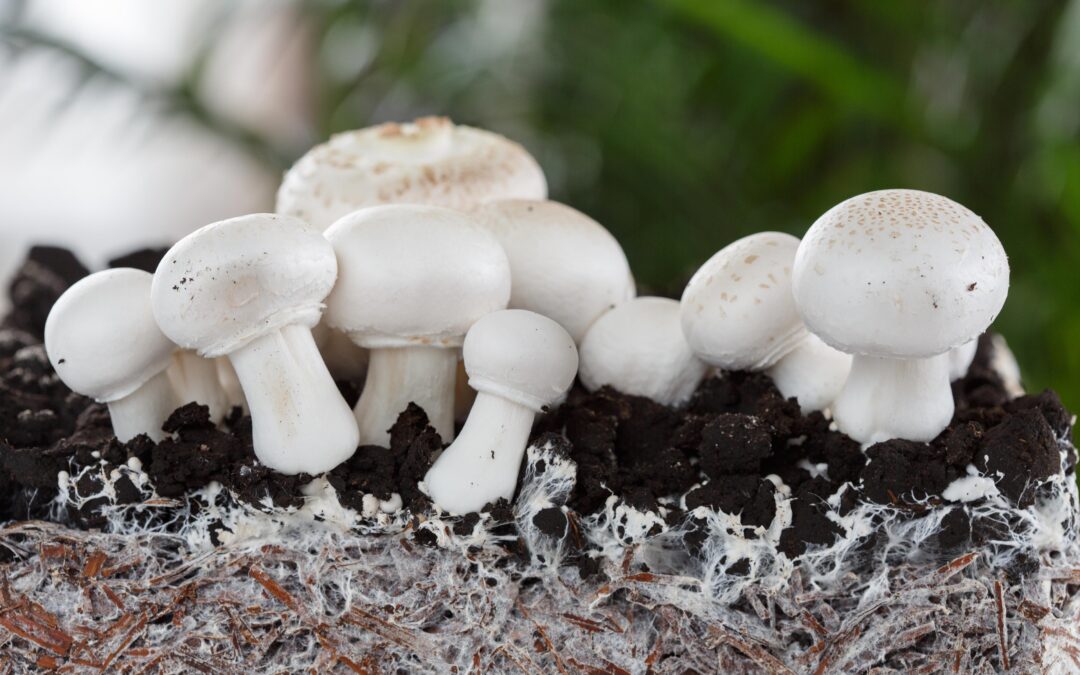Digestive enzymes play the role of helping to break down our food by creating chemical reactions, which makes them invaluable in supporting our digestive system. These primary enzymes are amylase, which helps to break down starches and carbs into sugars; protease, which is responsible for breaking down proteins into amino acids; and lipase, which breaks down lipids commonly known as fats and oils. Mycelium found in the network of the root system of mushrooms is another source of enzymes and is a potent elixir for health. Some state that the mushroom’s fruiting body is the only part of the fungi worth consuming, but that is not the whole story. Welcome the miracle mushroom, mycelium polysaccharides for health.
Mycelium is the vegetative part of fungi, consisting of a vast network of delicate, thread-like structures called hyphae. It plays a crucial role in nutrient cycling and decomposition in ecosystems. It is truly fascinating how it supports life underfoot. Mycelium has garnered increasing attention for its potential health benefits, particularly in recent years. The health benefits of mycelium from mushrooms are vast, as many people are discovering. Think of mycelium as the plant’s immune system; this system or network allows the mushroom to thrive.
There are benefits to mycelium and the fruit body of a mushroom. Testing has shown that more beta-glucans (polymers) exist in the fruit body (soluble and insoluble forms). Still, we must look at the whole, not just a part of the mushroom to understand the big picture, including the complex system of mycelium (much like another powerhouse green plant we all know and love that is most beneficial as a full spectrum) and you will discover, not all heroes wear capes.
*Those reading this blog over the years know that essential oil distillation does not remove much of the plant’s chemical compounds, and to get as close to the profile of the plant as possible, CO2 extraction is much more valuable. When it comes to mushroom extracts, many active ingredients are not extracted in the hot water process, which is the same issue presented with steam-distilled essential oils. Hot water extraction is only one of many methods to extract valuable constituents for mushrooms, although it is the most common.
Mycelium is not simply dug up from the ground and processed for consumption; it must be grown, or the proper term, fermented. Most reputable companies use organic brown rice to accomplish this task, while others use organic oats.
Because of this, nay-sayers state that mycelium-based products are ineffective and pumped full of fillers. It turns out that is not the full story.
Enter the research that found that mushroom mycelium and its fermented substrate have potential health benefits (Fungi Perfecti, 2019).
To summarize the research:
-Mushroom mycelium is “incredibly potent in triggering immune cell function.”
-Even when separated from pure mycelium, fermented substrate (organic brown rice) effectively supports natural immune function.
-Pure mycelium and fermented substrate each offer unique yet complementary health benefits.
-Many constituents, not just beta-glucans, stimulate the immune-enhancing benefits of mushrooms. Think of this as the whole, not just a piece.
The research confirms that the beneficial mushroom mycelium and the fermented substrate used to grow the mycelium are both immunologically active. They cannot be separated. This is comparable to other fermented products we know and love, including kombucha, yogurt, and kefir.
Polysaccharides are another bioactive constituent in the fruiting body and the mycelium (Liu et al., 2016). A growing body of research shows that these polysaccharides play an essential role in healthy gut microbiota as a form of prebiotics. These polysaccharides have anti-inflammatory, anti-tumor, and anti-cancer properties (Hyder & Dutta, 2021). The fruiting body and mycelium also contain beta-glucans, which stimulate and boost the immune system, helping the body defend against infections and disease.
*This article was not written to diagnose or treat disease, only to inform.
Mycelium shines in several areas, including its ability to increase nutrient absorption. That is important for those with gut imbalances and possibly even leaky gut. Mycelium is adept at absorbing nutrients from its surroundings, making it a rich source of vitamins, minerals, and other bioactive compounds. Consuming it can supplement our diet with these essential nutrients, promoting overall health.
Mycelium is also known for breaking down complex organic compounds, including toxins and pollutants, into simpler molecules that can be excreted from the body, such as sugars and amino acids. Therefore, we can reasonably conclude that mycelium’s enzymes can also detoxify our terrain, supporting the body’s detoxification processes when consumed. This is the likely explanation for mycelium’s anti-tumor action.
Many say that the liver does a fine job at detoxifying our bodies; however, much like a glass that can only hold so much water before overflowing, our increasingly toxic environment, coupled with mineral loss in food and not eating well enough, leaves our liver unable to function as well as it could. Much literature suggests an association between impaired detoxification and diseases like cancer, Parkinson’s disease, fibromyalgia, and chronic fatigue/immune dysfunction syndrome (Liska, The Detoxification Enzyme Systems 1998). We cannot leave it all to our liver without providing it with additional support.
Antioxidant Properties
Some mushrooms and mycelia are rich in antioxidants, such as polyphenols and flavonoids. Antioxidants can help combat oxidative stress and reduce the production of harmful free radicals, which may play a role in detoxifying the body. Some mushrooms high in antioxidants include shiitake, lion’s mane, and reishi. Antioxidants lower oxidative stress, which supports heart health and brain function (Mandal, 2018).
Immune System Support
Certain mushrooms, like Reishi and Turkey Tail, have been studied for their immunomodulatory properties. A well-functioning immune system is crucial for the body’s defense against toxins and pathogens.
It is important to note that while there is research on the potential health benefits of various mushrooms and their mycelia, the field of mycology and its connection to human health is still evolving. Specific effects and mechanisms of action can vary depending on the type of mushroom and its bioactive compounds.
It is essential to note that mycelium’s health benefits are still an active area of research, and while promising, more studies are needed to fully understand its mechanisms and potential. Mycelium is commonly consumed in various forms, such as dietary supplements, teas, and culinary dishes. However, consulting with a healthcare professional before incorporating it into a daily routine is advisable, especially if specific health concerns or conditions exist.
I am not a mushroom supplement company affiliate, but have a purchase criterion. Look for organic and sustainable. Look for a company that offers both the fruiting body and the mycelium. Stay tuned for future articles on the subject, as this is just the tip of the miracle mushroom iceberg.
To your health,
Leslie
References
Benson, K. F., Stamets, P., Davis, R., Nally, R., Taylor, A., Slater, S., & Jensen, G. S. (2019). The mycelium of the trametes versicolor (Turkey tail) mushroom and its fermented substrate each show potent and complementary immune activating properties in vitro. BMC Complementary and Alternative Medicine, 19(1). https://doi.org/10.1186/s12906-019-2681-7
Fungi Perfecti, L. (2019, December 6). Immune benefits of mushroom mycelium & fermented substrate validated by peer-reviewed science. PR Newswire: press release distribution, targeting, monitoring and marketing. https://www.prnewswire.com/news-releases/immune-benefits-of-mushroom-mycelium–fermented-substrate-validated-by-peer-reviewed-science-300970408.html
Hyder, M. S., & Dutta, S. D. (2021). Mushroom-derived polysaccharides as antitumor and anticancer agent: A concise review. Biocatalysis and Agricultural Biotechnology, 35, 102085. https://doi.org/10.1016/j.bcab.2021.102085
Liska, D. (1998). The Detoxification Enzyme Systems. October 17, 2023, http://anaturalhealingcenter.com/documents/Thorne/articles/DetoxificationEnzymes.pdf
Liu, X.-C., Zhu, Z.-Y., Tang, Y.-L., Wang, M., Wang, Z., Liu, A.-J., & Zhang, Y.-M. (2016). Structural properties of polysaccharides from cultivated fruit bodies and mycelium of cordyceps militaris. Carbohydrate Polymers, 142, 63–72. https://doi.org/10.1016/j.carbpol.2016.01.040
Mandal, Dr. A. (2018, August 23). Mushrooms contain high amounts of antioxidants that combat aging and promote health. News. https://www.news-medical.net/news/20171109/Mushrooms-contain-high-amounts-of-antioxidants-that-combat-aging-and-promote-health.aspx
Rubel, R., Santa, H. S., dos Santos, L. F., Fernandes, L. C., Figueiredo, B. C., & Soccol, C. R. (2018). Immunomodulatory and antitumoral properties of ganoderma lucidum and Agaricus brasiliensis (agaricomycetes) medicinal mushrooms. International Journal of Medicinal Mushrooms, 20(4), 393–403. https://doi.org/10.1615/intjmedmushrooms.2018025979




